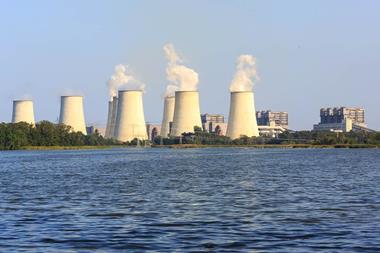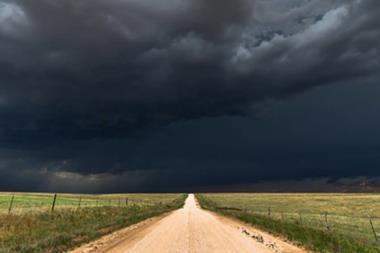The UK’s Universities Superannuation Scheme (USS) and experts at University of Exeter have produced a set of narrative climate scenarios to counter the “significant” limitations of the scenarios currently used by investors, governments and business.
Set out in a new report, ‘New scenario narratives for action on climate change’, the four scenario narratives go out to 2030 and are based on a framework that “embraces the radical uncertainties surrounding the potential positive as well as negative tipping points”.
The result, according to the report, is scenarios that focus less on the climate itself and more on “the vicissitudes of politics, markets and extreme weather events”.
Echoing recent criticism of mainstream climate scenario analysis, the report authors describe current reference scenarios as inadequate, involving implausible and partial narratives that limit the scenarios’ practical usefulness and inadvertently understate both the economic damage of climate change and the potential benefits of action.
The report authors drew attention in particular to the scenarios and methodologies from The Network for Greening the Financial System (NGFS), saying these were “failing to capture key aspects of the real world”.
The University of Exeter-USS report comes as staff at Banque de France have published a working paper proposing a set of short-term scenarios to assess the macroeconomic impacts of climate transition.
The new scenarios
Assumptions about the key drivers for the University of Exeter-USS scenarios were developed with the help of over 40 experts in geo-politics, climate policy, economics, finance, technology and consumer behaviour.
A common physical narrative is woven into all four scenarios, which includes representative events such as location-specific heatwaves, hurricanes and floods.
The scenarios themselves (see box) range from optimistic, with politics and economics working in harmony to drive rapid decarbonisation, to pessimistic, where a toxic political climate compounded by dysfunctional markets frustrates progress.
“Many organisations, not least in the investment community, are committed to playing their part in halving global greenhouse emissions by the end of the decade,” said Mark Cliffe, University of Exeter visiting fellow and lead author of the report.
“It is disturbing that only in the most optimistic of our four scenarios does this look to be plausible. We have no time to lose.”
USS’s role and plans
USS’s decision to collaborate with University of Exeter on a new approach to scenario analysis came after it undertook such analysis for its Task Force on Climate-related Financial Disclosures report in 2022.
“We hope this work represents the beginning of a much-needed shift in climate-related strategic decision-making”
Simon Pilcher, chief executive officer of USS Investment Management
The £75.5bn (€88bn) pension fund had also recognised that it shared concerns raised by the Real World Climate Scenarios initiative, a multi-disciplinary network of practitioners and experts launched early in 2022, and the University of Exeter-led Economics of Energy Innovation and System Transition project.
In working with University of Exeter, USS had two intentions. The wider one, by making the report public, is to stimulate debate among investors, policy makers and academic experts with a view to embedding a practical approach to climate scenario analysis into transition planning and financial decision-making.
“We hope this work represents the beginning of a much-needed shift in climate-related strategic decision-making both within the investment industry and potentially beyond, which is a cause for cautious optimism,” said Simon Pilcher, chief executive of USS Investment Management.
Another aim of the project with University of Exeter is to draw out the investment implications, looking at strategic asset allocation and risk management.
“We aim to lead in the development of this new approach that is less focused on precise estimation and more on understanding how real-world dynamics could play out in a complex world where climate risks cannot be looked at in isolation from political, economic, and technological factors,” said Mirko Cardinale, head of investment strategy and advice at USSIM.
“Moving forward, we intend to develop a long-term investment outlook informed by the scenarios and draw out investment implications for capital markets expectations, top-down portfolio construction, and country/sector preferences.”
In working with University of Exeter on this new approach to climate scenarios, USS also appears to have made an important contribution to the improvements called for by The Pensions Regulator recently.
From ‘Roaring 20s’ to ‘Meltdown’
The University of Exeter-USS report describes the scenarios as follows:
Scenario 1. Roaring 20s – policy and markets align
Proactive climate policies and dynamic markets create powerful positive feedback loops. More extreme weather events focus minds and create a sense of global solidarity around a recognition of humanity’s mounting debt to nature. Constructive competition between nations accelerates technological progress and deployment.
Scenario 2. Green Phoenix – market-driven, while policy lags
Climate action is initially upended by stagflation, the geo-political fallout of a stalemate in Ukraine and badly-handled weather shocks. Popular anger builds and civil society gradually emboldens more enlightened businesses and local governments to step up and roll out mature green technologies, but progress is patchy and erratic.
Scenario 3. Boom and Bust – policy steps up after fossil fuel surge bursts
A Ukraine peace deal and easing of global geopolitical tension triggers an initial surge in economic growth which leads to overheating in major economies and higher fossil fuel prices. Policy is tightened in response, which leads to a bust, forcing governments to step in to provide support. A just green transition is driven by pro-active policies to ease private sector frictions and support the emerging world.
Scenario 4. Meltdown – policy failures compound weak growth
Climate policy is the casualty of mounting geopolitical tension and protracted recession. A Republican victory in the US elections is followed by Ukraine being partitioned. Tension with China undermines global decarbonisation efforts and technological progress. Extreme weather events are badly handled, triggering famines, mass migration and political instability.
Source: ‘New Scenario Narratives for Action on Climate Change’
Read the digital edition of IPE’s latest magazine

















